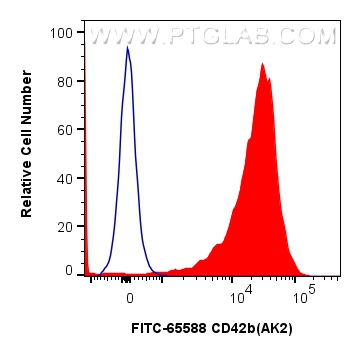验证数据展示
经过测试的应用
| Positive FC detected in | human peripheral blood platelets |
推荐稀释比
| 应用 | 推荐稀释比 |
|---|---|
| Flow Cytometry (FC) | FC : 5 ul per 10^6 cells in 100 μl suspension |
| This reagent has been pre-titrated and tested for flow cytometric analysis. The suggested use of this reagent is 5 ul per 10^6 cells in a 100 µl suspension or 5 ul per 100 µl of whole blood. | |
| Sample-dependent, Check data in validation data gallery. | |
产品信息
FITC-65588 targets CD42b in FC applications and shows reactivity with human samples.
| 经测试应用 | FC Application Description |
| 经测试反应性 | human |
| 免疫原 |
Human platelets 种属同源性预测 |
| 宿主/亚型 | Mouse / IgG2a |
| 抗体类别 | Recombinant |
| 产品类型 | Antibody |
| 全称 | glycoprotein Ib (platelet), alpha polypeptide |
| 别名 | GP1BA, GP1B, CD42b alpha, BSS, Antigen CD42b-alpha |
| 计算分子量 | 626 aa, 69 kDa |
| GenBank蛋白编号 | BC027955 |
| 基因名称 | CD42b |
| Gene ID (NCBI) | 2811 |
| ENSEMBL Gene ID | ENSG00000185245 |
| 偶联类型 | FITC Plus Fluorescent Dye |
| 最大激发/发射波长 | 495 nm / 524 nm |
| 形式 | Liquid |
| 纯化方式 | Protein A purification |
| UNIPROT ID | P07359 |
| 储存缓冲液 | PBS with 0.09% sodium azide, pH 7.3. |
| 储存条件 | Store at 2-8°C. Avoid exposure to light. Stable for one year after shipment. |
背景介绍
CD42b, also known as platelet glycoprotein Ib alpha chain (GPIb alpha), is a type I transmembrane glycoprotein of 135-145 kDa (PMID: 2656709). It is expressed on platelets and megakaryocytes. CD42b and CD42c (GPIb beta) are linked by a disulphide bond to form GPIb (PMID: 7660135). GPIb forms a noncovalent complex with CD42a (GPIX) and CD42d (GPV) and acts as a receptor for von Willebrand factor (vWF) and thrombin (PMID: 7660135; 3759960). The GPIb-V-IX complex mediates vWF-dependent platelet adhesion to blood vessels. Defects in the expression of CD42b result in Bernard-Soulier syndromes and platelet-type von Willebrand disease (PMID: 9371310).
实验方案
| Product Specific Protocols | |
|---|---|
| FC protocol for FITC Plus CD42b antibody FITC-65588 | Download protocol |
| Standard Protocols | |
|---|---|
| Click here to view our Standard Protocols |


